Did you know that many popular houseplants can be toxic to pets, especially in small living spaces where curious cats and dogs have easy access to everything? Even a small nibble on the wrong plant can cause serious health problems for your furry friends. That’s why this guide focuses on pet-friendly indoor plants for small homes.
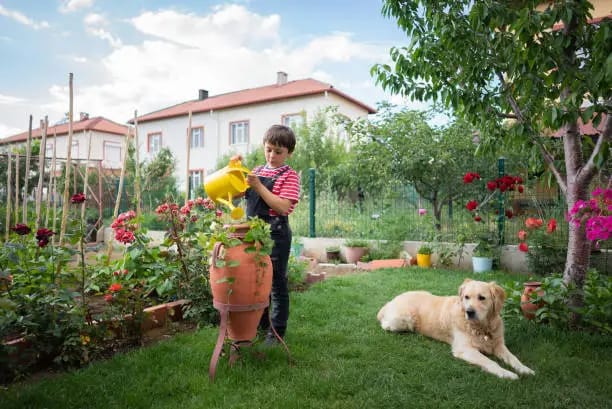
Choosing the right plants is important not only to protect your pets but also to get the most out of your small living space. In tight quarters, every plant you bring into your home needs to serve a dual purpose: improving your environment while making sure doesn’t pose a threat to your pets.
Understanding Pet-Friendly Indoor Plants
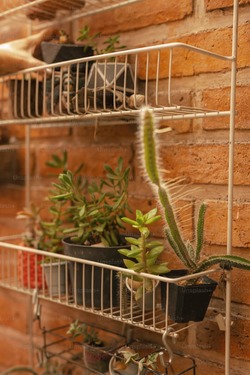
A pet-friendly plant is one that is non-toxic to animals, meaning it won’t hurt if your cat, dog, or other pet decides to bite or brush against it. Pet-friendly plants are safe to eat, which is especially important for curious pets who explore their environment with their mouths.
This is important because many common houseplants contain substances that can be harmful or even fatal to pets. In small homes, where pets and plants are often in close proximity, making sure each plant is pet-friendly is key to preventing accidental poisoning.
When choosing plants for a home with pets, it’s important to avoid common toxic types that can pose serious health risks. Some of the most dangerous plants include lilies, which are especially dangerous to cats. Aloe vera is known for its medicinal uses but is toxic to pets if ingested.
Which can cause vomiting and irritation; Philodendron, which can cause swelling and difficulty breathing and sago date, By cleaning up these and other poisonous plants, you can help ensure a safe environment for your pets.
Top 5 Pet-Friendly Indoor Plants for Small Homes
Spider Plant (Chlorophytum comosum)
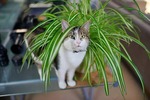
Description: A popular houseplant with arching, green, and white striped leaves that can brighten up any room.
Care Tips: Thrives in bright, indirect light and requires minimal watering, making it perfect for beginners.
Why it’s safe: Non-toxic to cats and dogs, it’s a great choice for pet owners.
Boston Fern (Nephroleps exaltata)
Description: Lush, feathery bunches add beauty and a touch of refreshing greenery to your home.
Care Tips: Prefers high humidity and indirect light, soil should be kept constantly moist.
Why it’s safe: Pet-safe, so you can enjoy its beauty worry-free.
Areca Palm (Dipsis luteuscens)

Description: A slow-growing palm with graceful, arching fronds that works well in small spaces.
Care Tips: Requires bright, indirect light and well-drained soil. Water regularly but allow the soil to dry out slightly between waterings.
Why it’s safe: Non-toxic to pets, providing peace of mind in any pet-friendly home.
Calathea (Calathea spp.)

Description: Known for its vibrant, patterned leaves that can add color to your interior.
Care Tips: Prefers low to medium light and high humidity. Keep the soil evenly moist.
Why it’s safe: Non-toxic to both cats and dogs, it’s a beautiful and safe addition to your home.
Peperomia (Pepiromia spp)

Description: A compact plant with thick, textured leaves that come in a variety of colors and shapes.
Care Tips: Performs well in low to moderate light and prefers to dry out between waterings.
Why it’s safe: Pet-friendly and easy to maintain, perfect for small spaces.
How to Choose the Right Plants for Your Space and Pets
Choose compact or slow-growing varieties.
Choose plants that naturally stay small or grow slowly to prevent overcrowding in confined spaces. Plants like Peperomia are ideal for small homes because they stay compact and don’t require frequent pruning.
Look for plants that tolerate low light.
Small spaces often have limited natural light. Choosing plants like Calathea or Maranta, which thrive in low to medium light, ensures that they will thrive in dim light areas.
Choose plants with air-purifying properties.
Enhance your small space by choosing plants like spider plants and Boston ferns, which not only fit well in compact areas but also help improve air quality, making your home more welcoming to you and your family.
Tips for Arranging Pet-Friendly Plants in Small Homes
- Use a hanging planter
Hanging planters are a great way to use vertical space to keep plants out of reach of curious pets. Plants like spider plants and Boston ferns thrive in hanging baskets and add greenery to eye level without taking up floor space.

- Use Windowsills
Windowsills are perfect for plants that need a lot of light, such as areca palm. These spots are usually higher, making them less accessible to pets. Just make sure the plants are secure and won’t be knocked over.
- Create a designated plant corner
Dedicate a corner of your home to your indoor plants. You can arrange plants of different heights in this area, using stands or stacked shelves to create a layered look. Keeping all plants in one area makes it easier to monitor your pet’s access.
- Place large plants on the floor in protective baskets
If you have large, pet-friendly plants like ponytail palms, placing them in protective baskets on the floor can prevent pets from digging in the soil. The basket adds a layer of protection and blends well with your home decor.
- Use room dividers or plant screens.
If you have a particularly curious pet, consider using a room divider or plant screen to create a barrier between the plants and your pet. It also helps to create a specific plant zone in your home.
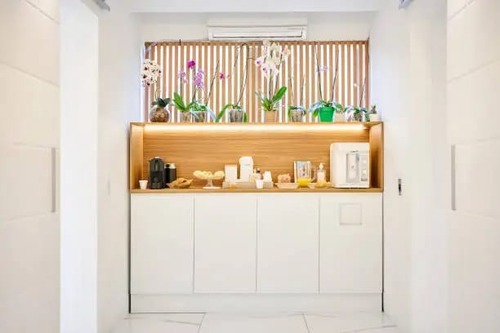
Caring for Pet-Friendly Indoor Plants
Monitor light levels
Place your plants where they get the right amount of light. For example, maranta prefer low to medium light, while areca palms thrive in bright, indirect light. In small spaces, natural light can be limited, so consider using grow lights for plants that need more light.
Keep humidity in check
Humidity levels in small homes can fluctuate, especially in winter. Plants like Boston ferns like high humidity. You can keep your plants moist by washing them regularly, placing them near a humidifier, or placing them on a tray filled with water and pebbles.
Water wisely
Overwatering is a common problem in small spaces where airflow may be restricted. Make sure your pots have good drainage and water only when the top inch of soil is dry. Succulents like baby rubber plants prefer slightly moist soil.
Frequently Asked Questions (FAQs)
- Why is it important to choose suitable plants for pets?
Answer: Choosing pet-friendly plants is important because many common houseplants can be toxic to pets. Ingestion of poisonous plants can cause health problems for pets, from mild stomach upset to severe poisoning, and even death.
- What are some common signs that a plant may be toxic to pets?
Answer: Symptoms of plant poisoning in pets may include vomiting, diarrhea, lethargy, lethargy, difficulty breathing, and changes in heart rate. If you suspect that your pet has ingested a poisonous plant, contact your veterinarian immediately.
- How do I know if a plant is safe for my pet?
Answer: To determine if a plant is safe for your pet, consult reliable sources such as the ASPCA’s list of poisonous and non-poisonous plants, or ask your veterinarian. The plants listed in this guide are all non-toxic to pets.
- Can pet-friendly plants still cause problems for my pets?
Answer: Although pet-friendly plants are non-toxic, they can cause mild gastrointestinal upset if eaten in large quantities. Additionally, some plants can cause mechanical irritation if pets chew on the leaves.
- What are the best pet-friendly plants for small homes?
Answer: The best types of pet-friendly plants for small homes include compact or slow-growing varieties, such as spider plants, Boston ferns, and peperomias. These plants are easy to care for, fit well in confined spaces, and are safe for pets.
Conclusion:
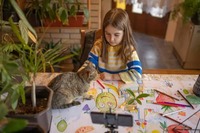
Choosing pet-friendly plants for small homes is essential to maintaining a safe and harmonious environment. In compact spaces, pets are more likely to come into close contact with plants, increasing the risk of accidental ingestion.
Choosing non-toxic plants ensures that your furry friend is protected from harmful substances that can cause serious health problems. Additionally, the right plants can improve your home’s ambiance without overwhelming your space.
